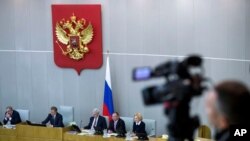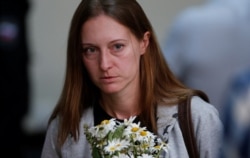At an appeals hearing Tuesday, Russian prosecutors accused journalist Svetlana Prokopyeva of being a "mouthpiece of the West" as the court upheld her conviction of "justifying terrorism."
The hearing came amid a wider backdrop of Moscow taking legal action against her employer, Radio Free Europe/Radio Liberty. A Russian court last month fined the independent U.S.-funded news network for not complying with its foreign agents law.
Russia's use of legal action against RFE/RL is an attempt to cut off access to independent media, media and regional analysts say.
Moscow has been "building a web of laws and restrictions non-stop against RFE," said Thomas Kent in an interview with VOA's Russian service. Kent was president of the network from 2016 to 2018.
The fines against RFE/RL are a sign that Russia is implementing those laws, Gulnoza Said, from the New York-based Committee to Protect Journalists (CPJ), told VOA.
The network was fined 1.1 million rubles ($14,400 USD) last month for not complying with Russia's newly revised foreign agents law. The fines were directed at the general director along with RFE services, including Radio Liberty and the Russian-language TV network Current Time that the produces with VOA.
Current Time is a 24/7 television and digital network for Russian speakers, led by Radio Free Europe/Radio Liberty in cooperation with Voice of America.
Under amendments to the law last year, outlets receiving international funding must label their content as produced by "foreign agents."
RFE/RL is an independent grantee of the U.S. Agency For Global Media, which also oversees VOA. Both receive funding from Congress but are editorially independent.
Russia's decision to add further provisions to its law was criticized by international rights groups including Amnesty International, who in a statement last year said the law was a further attempt by authorities to "shut down dissent."
"[The law] will put the stigmatizing label of 'foreign agent' on individuals — as it has done [for years] on independent NGOs — who are deemed to 'participate in political activity in the interest of foreign states,'" Amnesty's Russia researcher Natalia Prilutskaya said.
Moscow made other changes to the law in 2017 in response to Washington ordering all U.S.-based Russian media to register as foreign agents.
RFE/RL had refused to comply with the revised legislation "for fear it will discredit their work," according to U.S. lawmakers. In a letter to President Joe Biden, lawmakers called on the administration to make clear to Russia that restrictions on RFE/RL were unacceptable and "will be met with serious consequences."
RFE/RL's journalists are often the "best of the best" in the regions they cover, Said, who heads CPJ's Europe and Central Asia program, told VOA.
Ordering international outlets to label content as produced by a foreign agent harkens back to Soviet times and creates distrust among readers and audiences, Said told VOA, adding "the ultimate goal is to discourage Russians from using this information."
Kent said he believes Moscow is trying to obstruct the network's journalists because RFE/RL is one of a few remaining independent media outlets covering Russian news.
"For a couple of decades now the Russian government has been trying to obstruct the work of Radio Svoboda (Radio Liberty). It's one of the biggest means of mass media in Russia that's not under the control of the Kremlin," said Kent, a senior fellow at the Jamestown Foundation, U.S.-based research and analysis organization.
The press office of Russia's embassy in Washington, D.C., did not respond to VOA's request for comment. But a leading backer of the foreign agent legislation, lawmaker Andrei Klimov, was cited in The New York Times as saying that RFE/RL had "nothing to do with journalism" and followed "direct orders of the State Department." He added that the foreign agents' legislation needed to be tightened ahead of parliamentary elections this year.
In Prokopyeva's case, the appeals hearing reflected a wider trend of Russian authorities using legal action against independent voices, media analysts said.
The journalist was convicted last year of "justifying terrorism" — a charge upheld by the military appeals court Tuesday. The accusations stem from comments Prokopyeva made in an interview about a suicide bombing. When the lower court convicted Prokopyeva, it fined the journalist and confiscated her equipment.
At the time, RFE/RL's acting president, Daisy Sindelar, condemned the lower court's decision, saying, "The portrayal of her words as 'justifying terrorism' is a deliberate and politically motivated distortion aimed at silencing her critical voices."
Said told VOA the appeal verdict was disappointing. CPJ awarded Prokopyeva last year with its International Press Freedom Award.
"It's so emblematic of how Russian authorities treat journalists, not just those who work for outlets like RFE/RL that are funded from abroad, but any journalists, including those working for local media who dare to criticize the authorities, or even say something that's not in line with the Kremlin narrative," Said told VOA.
Russian authorities see Western reporting as an attempt to interfere in Russian affairs and don't like its positions on human rights and press freedom, Said added.
"Some of them probably very sincerely believe that the West has an agenda of destroying (Russian President Vladimir) Putin's regime by having RFE/RL report on various issues, including corruption," she said.
Kent shared a similar view, saying attempts to obstruct reporting "comes down to the government feeling that it has the right to decide what information Russian people receive and that the Russian people are not competent to figure out themselves."
VOA's Misha Gutkin contributed to this report.







